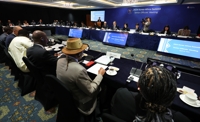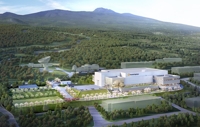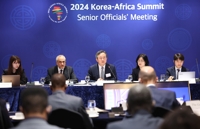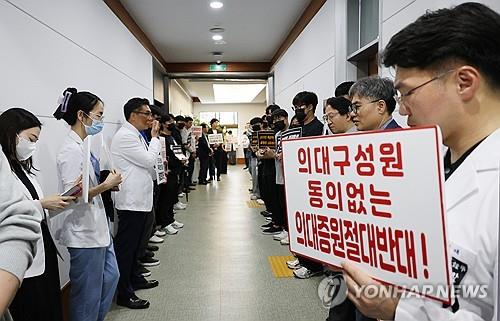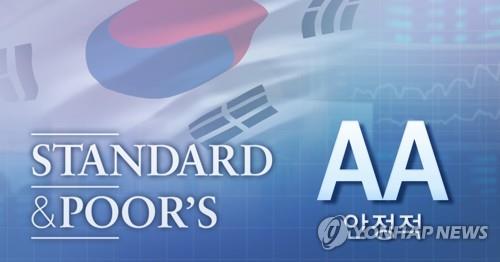(LEAD) (Yonhap Interview) Senior UNHCR official stresses need for mechanisms in place for asylum-seekers
(ATTN: CORRECTS headline, lead, paras 2-4 to clarify Mazou's remarks; TRIMS)
By Kim Hyun-soo
SEOUL, April 5 (Yonhap) -- Countries should make sure that they have mechanisms to provide refugees and asylum-seekers with the help they need, a senior official of the U.N. refugee agency said Friday.
Raouf Mazou, assistant high commissioner for operations of the U.N. High Commissioner for Refugees (UNHCR), made the remarks during a visit to Seoul, highlighting that one of the UNHCR's roles is to support countries in providing assistance and asylum to those fleeing persecution.
"The most important thing is that people who arrived in a country should be in a position of seeking asylum and explaining why they need international protection," Mazou said in an interview with Yonhap News Agency.
"All people who arrive in a country, whether it is in Italy, whether it is in the U.S., whether it is in Switzerland, they should put in place mechanisms for people who arrive to be able to seek asylum," Mazou said.
"We're created to remind countries of the importance of that institution of asylum, making sure that you have mechanisms for people to be able to be given asylum," he said.

Raouf Mazou, assistant high commissioner for operations of the U.N. High Commissioner for Refugees (UNHCR), speaks during an interview with Yonhap News Agency in Seoul on April 5, 2024, as provided by the UNHCR. (PHOTO NOT FOR SALE) (Yonhap)
According to UNHCR data, 108.4 million people were forcibly displaced worldwide in the same year as a result of persecution or human rights violations, an increase of about 19 million people year-on-year, marking the largest leap on record. The figure includes refugees, asylum-seekers or internally displaced people.
Mazou, who oversees operations in seven regions with expertise on emergency response and security management, applauded South Korea's increasing contributions in the official development assistance (ODA) as "remarkable," especially when the contributions from other countries have fallen short to match the surge of refugees globally.
"South Korea is an example of a country that can shift from conflict, difficulties, to being a country that helps," he said, noting the transformation of the country from an "aid recipient" to one of the top donors of the organization.
South Korea set the ODA budget at a record high of 6.3 trillion won (US$4.7 billion) for this year, up 31.1 percent from the previous year. Of the total, 17.5 percent is earmarked for humanitarian crisis response projects in countries affected by war and disasters.
In 2022, the U.N. refugee agency received some 5.8 billion won in aid, failing to meet the 10.7 billion-won budget it had set for the year.
Mazou said South Korea's overall funding to the UNHCR, combining the contributions from the private sector, stood at about $71-73 million over the past three years.
"Korea is doing a lot more and more, and we see that increasing and we're really encouraging Korea to do more on the political level."

Raouf Mazou, assistant high commissioner for operations of the U.N. High Commissioner for Refugees (UNHCR), speaks during an interview with Yonhap News Agency in Seoul on April 5, 2024, as provided by the UNHCR. (PHOTO NOT FOR SALE) (Yonhap)
Mazou also called for South Korea to take a more active approach, citing the country's election to the U.N. Security Council as a nonpermanent member for the 2024-25 term, calling it an "opportunity in which Korea can put its weight in."
Media and lawmakers also play a critical role in helping people understand that providing asylum is not a negative act, he added.
Pointing to the issue of deep-seated prejudice against refugees and the low refugee acceptance rate in South Korea hovering at around 2 percent on average, Mazou suggested that the issue of accepting refugees should be considered from a much broader perspective, such as understanding why they had to leave their homeland.
"You need to understand the reasons why people are leaving and make sure that you address these reasons," Mazou said, noting that climate change served as one of the main reasons.
"One needs to look at displacement movements, migration, in a much more holistic way and really see what are the causes," he said.
sookim@yna.co.kr
(END)
-
 BTS' RM to prerelease a track of 2nd solo album
BTS' RM to prerelease a track of 2nd solo album -
 'Queen of Tears' weaves rich tapestry of Korean contemporary art
'Queen of Tears' weaves rich tapestry of Korean contemporary art -
 From pastime to academic discipline: Exhibition spotlights evolution of Korean embroidery
From pastime to academic discipline: Exhibition spotlights evolution of Korean embroidery -
 Indonesia coach left with mixed feelings after eliminating native S. Korea in Olympic football qualifiers
Indonesia coach left with mixed feelings after eliminating native S. Korea in Olympic football qualifiers -
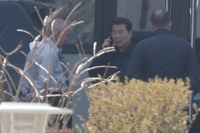 N. Korea calls envisioned U.S. aid to Ukraine 'hallucinogen'
N. Korea calls envisioned U.S. aid to Ukraine 'hallucinogen'
-
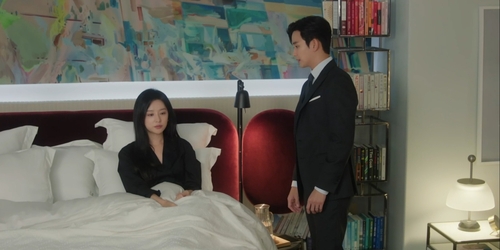 'Queen of Tears' weaves rich tapestry of Korean contemporary art
'Queen of Tears' weaves rich tapestry of Korean contemporary art -
 From pastime to academic discipline: Exhibition spotlights evolution of Korean embroidery
From pastime to academic discipline: Exhibition spotlights evolution of Korean embroidery -
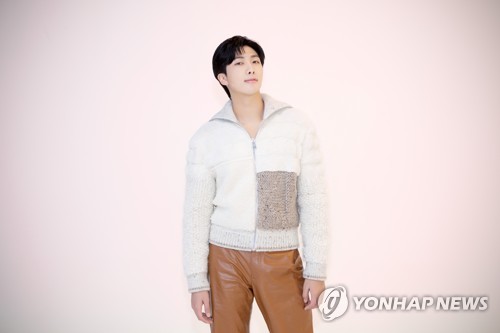 BTS' RM to prerelease a track of 2nd solo album
BTS' RM to prerelease a track of 2nd solo album -
 Looming weekly closure of major hospitals feared to worsen medical service crisis
Looming weekly closure of major hospitals feared to worsen medical service crisis -
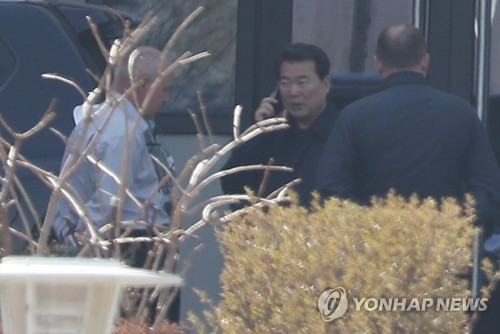 N. Korea calls envisioned U.S. aid to Ukraine 'hallucinogen'
N. Korea calls envisioned U.S. aid to Ukraine 'hallucinogen'
-
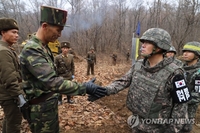 N. Korea installs mines on inter-Korean road within DMZ
N. Korea installs mines on inter-Korean road within DMZ -
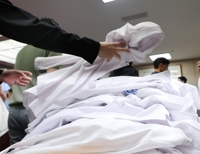 Two major hospitals in Seoul set to suspend outpatient clinics, surgeries
Two major hospitals in Seoul set to suspend outpatient clinics, surgeries -
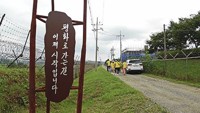 Gov't to open 10 trails near DMZ for visitors next month
Gov't to open 10 trails near DMZ for visitors next month -
 NIS sees possibility of N. Korean terrorist attacks involving drones, paragliders
NIS sees possibility of N. Korean terrorist attacks involving drones, paragliders -
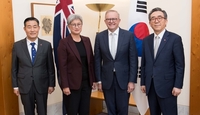 (LEAD) S. Korean ministers, Australian PM agree to enhance security, defense industry cooperation
(LEAD) S. Korean ministers, Australian PM agree to enhance security, defense industry cooperation
















